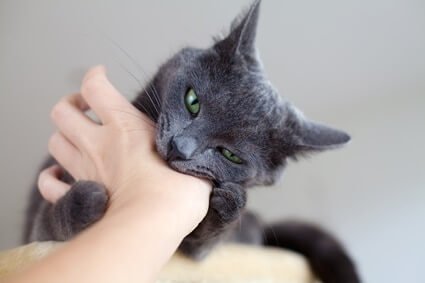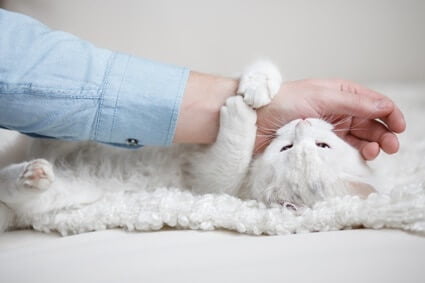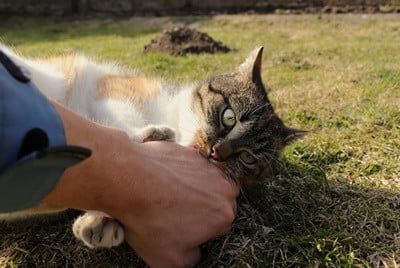When a cat bites, it’s not necessarily due to anger or aggression. Cats sometimes give their owners “love bites,” which is a gentle bite that serves as a form of affection. Cats also bite without drawing blood to communicate.
Cats bite to show affection and gain their owner’s attention. Instead of biting down hard, they’ll gently nip and nibble on a part of their body (most likely the hands or fingers) to communicate. This most commonly happens when cats feel bonded with their owners. Gentle biting also happens when kittens play. They nibble as part of a fun game and don’t have much strength to bite down hard. Other times, a gentle bite serves as a warning that they no longer want to be touched. The next stage is overstimulation.
You mustn’t allow your cat to become overstimulated before it bites you, or it may draw blood and cause harm. If your cat displays signs of anger or frustration, move your hand away and leave it alone for a little while to calm down.
Do Cats Bite Affectionately?
It might surprise you to feel your cat nibbling at your hands or fingers gently instead of biting down hard. If you’ve not experienced this before, your cat’s giving you a love bite.
Love bites are different from aggressive bites. The latter is more troublesome because biting is one of the most common acts of aggression and signifies a behavioral problem. Aggressive bites are the result of:
- Stress
- Illness
- Pain or injury
- Fear or nervousness
- Poor environmental factors
Cats that aggressively bite draw blood and leave puncture wounds and scratches. That’s because the cat’s purposely trying to harm you. The bite’s also accompanied by several behavioral cues, including:
- Hissing
- Spitting
- Arched back
- Fluffed-up tail
In comparison, affectionate biting is much gentler and barely makes a mark. This is thought to be reminiscent of how a mother cat grooms her kittens with small bites. Cats that have had at least one litter are more likely to do this.
Why Do Cats Give Gentle Bites?
As mentioned, cats give gentle bites, which tend to be a positive sign. Delicate bites from cats start as licks and gradually turn into nips and nibbles. A love bite doesn’t break the skin, and it shouldn’t hurt. If it does, you’re dealing with an aggressive bite. If you’re wondering why do cats bite gently, these are the most likely reasons:
Affection
Affection is the most common reason for your cat’s love bite. If your cat’s bonded with you, it’ll shower you with love and become clingy. While this can sometimes be annoying for owners, this behavior is reserved for people they trust.
On the flip side, Behavioral Processes explain how cats take behavioral cues from their owners. If you offer your cat frequent attention, it’ll begin to expect it more often. Gentle biting is a part of this behavior.
Love bites can also be a plea for more attention. However, don’t cave into an attention-seeking cat’s behavior, or it’ll become naughty and misbehaved. If your cat starts biting you too often, ignore it and leave it to cool off. Keep the petting sessions brief not to provoke your cat or cause it distress.
Play Fighting
If you’re playing with your cat, it doesn’t want to hurt you with a bite that draws blood. Instead, it’ll gently nibble on you as part of the game. Cats also use love bites to warn their owners that they’re being a bit too rough.
This is more common in kittens who are exploring their strength and abilities. As described by the American Zoologist, social play is essential for kittens, as it teaches them to develop social behavior and gets them ready for adulthood.
Even though some cats become overstimulated by the interaction, it’ll only become an issue if you ignore the early signs. Otherwise, the cat’s gentle bite may become nasty and inflict damage.
Gaining Your Attention
Some cats need attention and human affection more than others. If you’re not providing your cat with enough of it, it’ll gently bite your fingers or hand to encourage you to stroke or pet it.
While some cats use a love bite as a warning to stop stroking, others do it as a way of asking you not to take your hand away. If your cat desperately wants your attention, it will display other signs and will:
- Cry and vocalize more frequently
- Become destructive
- Groom more often
- Butt its head or rub against you
- Roll onto its back to expose its belly
You should give your cat around 20-30 minutes of attention a day. Kittens require more, as they benefit from mental enrichment. This prevents boredom and strengthens the bond between you and your cat.

Communication
Cats use various methods to communicate with their owners. Some cats use a gentle, unexpected nibble to reward attention or encourage you to keep petting it. Other cats gently bite in order to communicate with their owners to stop what they’re doing.
At first, you might feel as if your cat’s being ungrateful or needlessly aggressive, but it’s nothing personal. Your cat’s simply using the means it has to let you know what it likes and doesn’t.
Warning
If your cat gives you a soft, gentle bite while you’re playing with or petting it, it’s a warning that your cat doesn’t enjoy the way you’re handling it. In a way, this is a form of affection, as your cat’s giving you a chance to stop before things get serious and it’s forced to hurt you.
Don’t take this personally – your cat is getting the message out before resorting to other measures. However, the situation could turn ugly at any moment, so tread carefully.
Why Does My Cat Bite Me While Purring?
It’s a common misconception that purring is simply for pleasure. Purring isn’t always a happy sign – it can also signify pain or sadness. One minute your cat seems happy and content; the next, it bites you at the same time as purring. This is confusing as it often comes without warning, leaving you with little time to be prepared.
Overstimulation is to blame. Similarly, because your cat has thin skin, it can only bear a small amount of physical stimulation before it begins to feel uncomfortable.
In this scenario, your cat’s purr is the first warning that your cat’s becoming overstimulated. Then, the purr will become less quiet and gentle, instead turning loud and abrasive. This means your cat’s trying to remain calm. Other symptoms include:
- Swishing tail
- Ears flattening against the head
- Dilated pupils
- Fidgeting during petting
- Attempting to escape
- Watching your hands carefully
- Growling or hissing
Once you stop these signs, immediately stop petting your cat and let it go.
Why Does My Cat Bite Me and Then Lick Me?
It’s undoubtedly confusing when cats bite and then immediately proceed to lick your hand. There are a few simple reasons for this behavior, which includes:
Playing
When cats bite and lick simultaneously, they’re treating you in the same way as other cats. Your pet wants to play with you, and biting and licking are all part of the fun. After the first bite and lick, your cat may immediately start going after toys in search of something else to play with. Tread carefully, though, as this can lead to overstimulation.
Overstimulation
Biting and subsequent licking is a tell-tale sign of overstimulation. This is where the cat becomes riled up to the point where it turns from being pleasant and affectionate to uncomfortable or aggressive. This is usually caused by you petting your cat in the same spot for too long.
Agitation
Other times, your cat is communicating with you that it’s feeling over-agitated. It doesn’t want to sour relations, but it wants you to ease what you’re doing. This is your cat’s way of maintaining your bond. Cats also pick up on human emotions, so they may be intelligent and tuned in to you enough to know not to upset you.
Grooming
There is another reason your cat bites then licks you. Your cat could be falling into grooming patterns mid-bite. In this case, your cat’s not actually licking you but attempting to lick its fur to clean you. In fact, it might not even be biting you at all but gnawing at its skin to remove dirt and debris and smooth out the fur.
Alternatively, your cat may be grooming you. If you’re both strongly bonded, your cat sees you as its kin and will groom you just like its mother did.

Why Does My Cat Bite Me When I Pet It?
It’s not uncommon for your cat to suddenly bite you while you’re petting it. This can be confusing, especially if it seemed to enjoy your attention beforehand. One likely reason for this is overstimulation. Repetitive petting can cause your pet to become too excited, triggering an arousal-based bite.
Another reason your cat nibbles when petting is because of static electricity. Prolonged, repetitive stroking sometimes creates shocks along your cat’s skin, making it feel irritated. This causes the cat to develop a negative association with the action of you petting it.
Your cat could also be experiencing pain or discomfort. If you touch a sensitive spot, it’ll instinctively react by biting you. There are several warning signs that you can observe to help you prevent a petting-induced bite, such as the:
- Ears go back
- Tail or skin begins to twitch
- Pupils dilate
- Cat starts to growl
- Claws unsheathe
- Body stiffens
Although it’s difficult, don’t take this personally. Your cat isn’t biting you because it doesn’t like you, but is doing so because it feels uncomfortable in some way. Leave your cat be and try petting it again another day.
How To Respond To Love Bites
Don’t confuse love bites with aggression bites. They’re very different and have contrasting meanings. Because of this, don’t shout at your cat. To help you take the best course of action, study your cat’s body language and mannerisms. As soon as you see signs of distress or discomfort, pull your hand away slowly so that your cat no longer has access to it.
You might also notice that your cat stops biting when you reduce the frequency of petting. In this case, you can safely assume that the two are linked, so try not to pet your cat in the same spot for prolonged periods of time. Pause often to gauge your cat’s attention and interest, and move onto games and toys to discourage biting behavior.
As mentioned, never shout, shake, spray, or frighten your cat if it offers you a love bite. It’s doesn’t intend to hurt you, and doing so can cause your pet to bite down harder, inflicting a wound. Instead, redirect your cat’s attention and naturally encourage your cat to stop biting you.
In most cases, a gentle love bite is a sign of affection. Unhappy or fearful cats bite to inflict pain. They don’t always do this on purpose, but you’ll know when your cat’s being kind and affectionate because you won’t experience a puncture wound and the bite won’t hurt. Just be mindful of your cat’s body language and behavior to ensure your cat doesn’t feel angry or upset for any reason.

